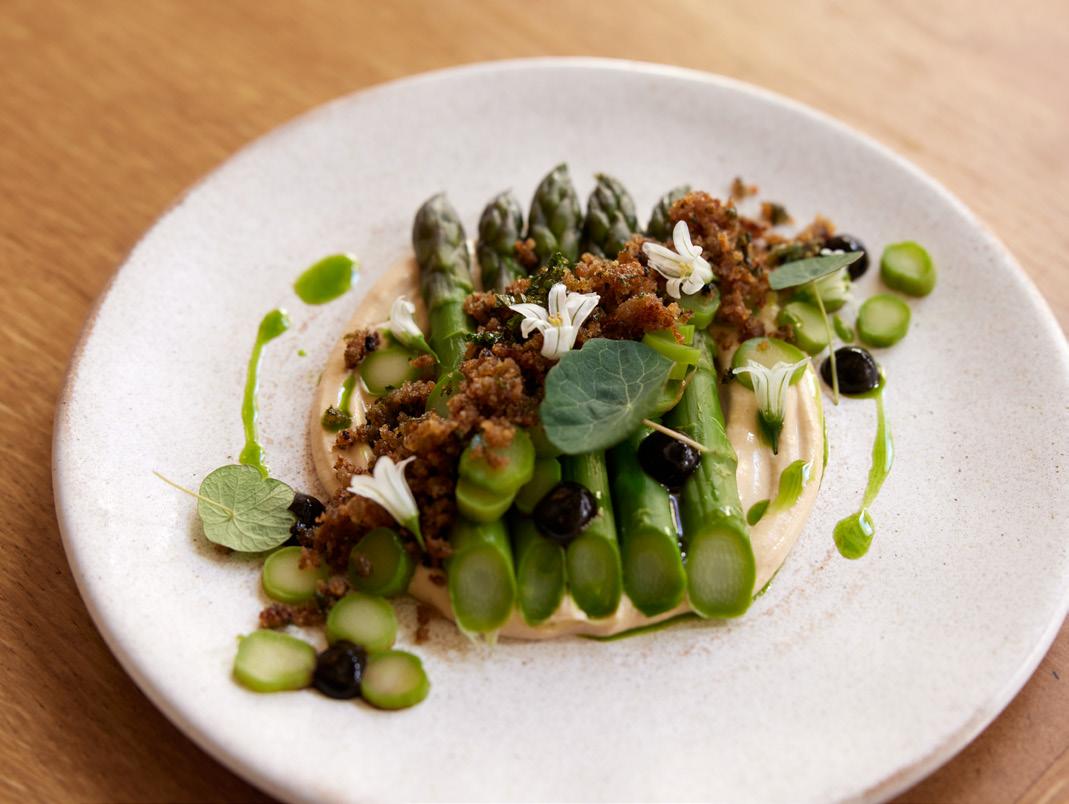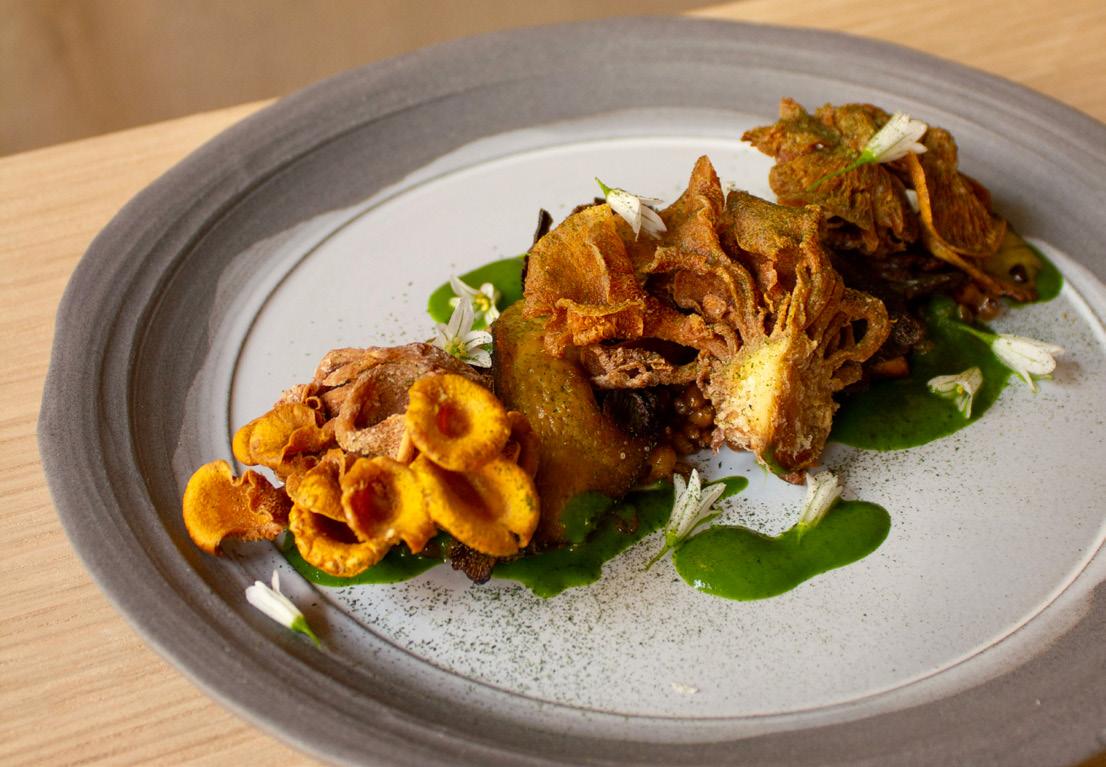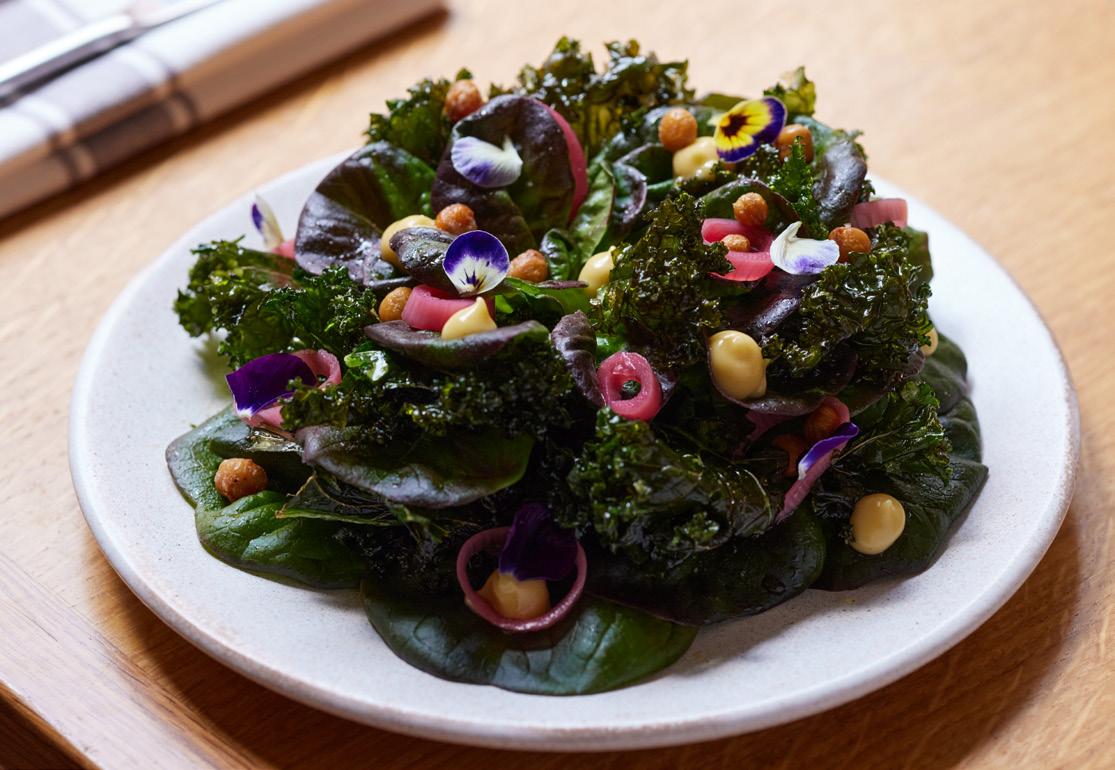
7 minute read
Meet the Chef: Chantelle Nicholson
Green Michelin star chef, Chantelle Nicholson, is a pioneer of regenerative practices in the professional kitchen, and thrives from working with excellent producers and cutting unnecessary items from her kitchen, like cling film and plastic chopping boards.
Chantelle Nicholson is continually innovating. Known for her pioneering regenerative ethos that goes far beyond the term "sustainability", she uses a very holistic approach to her kitchen. She describes it as 'conscious cooking' –instead of relying on the word sustainability, which she rightly points out only means to 'sustain', when instead we need to do more and actively 'regenerate'.
Chantelle was awarded the prestigious green Michelin star at Apricity, which opened in London's Mayfair in 2022. She's one of just 36 Green star holders in Great Britain and Ireland. It recognises her environmental efforts from her excellent regenerative producers, to how she leads the kitchen, that reach well above the parameters of Michelin's usual star. Though she has practised this way of working for years prior to winning this accolade.
Despite Chantelle forging her career as a successful chef and championing regenerative practices, she says "becoming a chef was never in my thoughts until my early 20s," as she trained as a lawyer in her home country of New Zealand. "It was never on the table as a career path until I actually started doing it professionally. What was a part-time job to fund some of my living costs at university became a full-fledged career."

Though looking back, cooking was always part of her life, as she says, "my first memories were of food". She was taught to cook by her parents, who were "both good home cooks", and her gran, who she says cooked everything from scratch and reused everything, too. While two of her aunts were exceptional cooks, one of whom was very focused on baking and preserving, which has had a lasting impact on Chantelle's work.
The practices of reusing and preserving were embedded in her from a young age. "Waste was just not something we did as a family", she says. She grew up surrounded by her family growing produce, and her extended family had a large stone fruit orchard, which meant she was "always hugely appreciative of how hard people worked to grow and make tasty food," which has fuelled her commitment to not only cooking consciously, but also to have a deep respect for food.

This meant when Chantelle ran her own restaurant kitchen, she says she was "able to come full circle to what had been embedded in her from a young age. That waste, of all kinds, needed to be eradicated as much as possible, and local, seasonal food needed to be celebrated". It's something Chantelle had initiated at her most recent project, outside of the capital in West Sussex, where she was part of the first phase of opening the Cordia Collective at Borde Hill Gardens. She was able to grow her regenerative ethos, working with producers who are already following these practices.
Prior to having her own restaurant at Apricity, Chantelle's first chef role in the UK was at the prestigious Savoy Grill in 2004. A decade later, she was running a fully vegan restaurant, Treadwells, also in central London, which was initially part of Marcus Wareing's group (whom she had worked for and quickly rose up the ranks). She then owned Treadwells from 2018 onwards, which also led her to publish her debut cookbook, Planted in the same year, despite not being vegan or vegetarian herself, but it was a challenge she enjoyed.

Another challenge Chantelle succeeded at was implementing the processes that fitted her ethos right from the start when she opened Apricity in 2022. The restaurant is low waste – though it's always the goal to waste as little as possible, Chantelle doesn't describe it as 'zero waste'. The team are constantly finding innovative ways to reduce everything, from how to use often wasted parts of produce, such as vegetable and fruit trims and leftover bread, that usually head straight for the bin. There's currently the 'crumb to crust' bread on the menu, which incorporates any leftover bread into a new loaf, ensuring a closed loop process..

Chantelle doesn't have cling film in the restaurant either, a habit she said takes some people a while to break. Instead, she uses reusable containers. She's also swapped plastic chopping boards for wood, as plastic boards tend to shed microplastics with continued use.
The practice also doesn't just apply to food at the restaurant either, as Chantelle ensures it's broadened out to all aspects, including energy use, where appliances are only switched on when they're in use, as well as using water carefully. This year, Chantelle's also taking part in a pilot scheme to reduce the amount of pollution that comes from professional kitchens, which, along with being better for the environment, is also improving air quality for staff and diners.

The restaurant is closed two days a week, which allows staff time to properly regenerate themselves. Although this practice is becoming more common in hospitality, it was once unheard of. "It's about changing habits and mindsets," she explains. The restaurant's name also points to a form of regenerating, too, as Apricity comes from the Latin meaning ‘warmth of the sun in winter,’ which always gives a real energy boost during the darker months.

Chantelle designs the menus backwards, starting from what's available from local suppliers such as regenerative fruit and veg growers at Shrub, who offer what's ready to sell, rather than chefs demanding what they want. This dictates the menu, and Chantelle was one of the early adopters of working in this way.
To reduce food waste further, she says she "would like to get to a place of just offering a tasting menu, and not a la carte as well, but I don't want to be just a special occasion restaurant". And in the difficult climate that hospitality's in already with an increase in employee National Insurance contributions, rises in business rates and continued staff shortages, it's just not viable at the moment.

Often on the menu at Apricity are offal dishes, such as ox tongue, which is having a renaissance, as well as hogget from Otter Valley in Devon, which is an older lamb (usually a year or two old, opposed to lamb being under a year) and hand-dived scallops, which aren't dredged and damage the seabed. There's also hyperlocal produce like the London Butterhead lettuce with miso, pickled shallots and dried Sussex tomatoes, and the entire menu changes not only with the seasons, but as often as daily, depending on availability.
Now we're into a new season in autumn, it's a welcome change when it comes to produce. "I like the changing seasons. It's always nice seeing the different ingredients. We're at the end of summer's bright colours, and we're moving into the orangey and beige autumn tones, slow cooking and cosier dishes," she says. With it, comes the chance to both innovate with new produce and regenerate the menu, too.
Words: Emma Henderson










